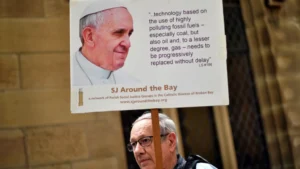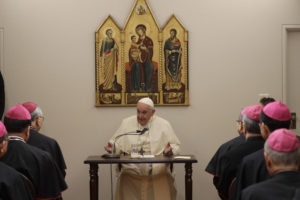Obama Owes More on Religious Freedom
On contraception, Obama threw his progressive Catholic allies under the bus, strengthened the very forces inside the church that sought to derail the health care law, and created unnecessary problems for himself in the 2012 election.
One of Barack Obama’s great attractions as a presidential candidate was his sensitivity to the feelings and intellectual concerns of religious believers. That is why it is so remarkable that he utterly botched the admittedly difficult question of how contraceptive services should be treated under the new health care law.
His administration mishandled this decision not once but twice. In the process, Obama threw his progressive Catholic allies under the bus, strengthened the very forces inside the church that sought to derail the health care law, and created unnecessary problems for himself in the 2012 election.
This might not have mattered if Obama had presented himself as a pure secular liberal. Before he was elected and after, he held himself to a more inclusive standard, reassuring many religious moderates.
His deservedly celebrated 2006 speech on religion and American public life was a deeply sophisticated and carefully balanced effort to defend the rights of believers and nonbelievers in a pluralistic republic.
Obama’s speech at Notre Dame’s graduation in 2009 was another tour de force. His visit to South Bend was highly controversial among conservative and right-wing Catholics. Yet the address he gave temporarily silenced many of his critics because it showed both an appreciation for the Catholic Church’s contributions to American life — particularly through its vast array of social-service and educational institutions — and a great instinctive feeling for Catholic sensibilities.
In the health care law, Obama annoyed some in his liberal base by making sure that Catholic institutions do not have to perform or pay for abortions. Yet rather than praising him for this, the bishops and the Catholic right invented the idea that the health law does cover abortion.
It doesn’t, as Sister Carol Keehan, president of the Catholic Health Association, insisted. In backing the administration’s view on this, she braved attacks and discipline from the bishops. That’s why it was unconscionable for Obama to leave her hanging out to dry.
At issue in the new controversy were regulations promulgated Jan. 20 by the Department of Health and Human Services as to which medical services should be covered by insurance policies that will be supported under the Affordable Care Act.
In its interim rules in August, HHS excluded only those “religious employers” who primarily serve and employ members of their faith traditions. For the Catholic Church, this had the effect of exempting churches from the rule, but not most Catholic universities, social-service agencies and hospitals that help tens of thousands of non-Catholics.
It made perfect sense to cover contraception as a general matter. Many also see it as protecting women’s rights, and expanded contraception coverage can reduce the number of abortions. While the Catholic Church formally opposes contraception, this teaching is widely ignored by the faithful. One does not see many Catholic families of six or 10 or 12 that were quite common in the 1950s. Contraception might have something to do with this.
As a Catholic, I wish the church would show more flexibility on this question. But as an American, I understand why its leaders felt that the broad contraception mandate encroached on the church’s legitimate prerogatives. The administration should have done more to balance the competing liberty interests here.
And it was offered a compromise idea by Melissa Rogers, the former chair of Obama’s Advisory Council on Faith-Based and Neighborhood Partnerships. (Rogers and I have worked together on religion and public life issues over the years, though I played no role in formulating her proposal.) On The Washington Post’s “On Faith” forum in October, she pointed to a Hawaii law under which “religious employers that decline to cover contraceptives must provide written notification to enrollees disclosing that fact and describing alternate ways for enrollees to access coverage for contraceptive services.” The Hawaii law effectively required insurers to make such coverage affordable.
Unfortunately, the administration decided it lacked authority to implement a Hawaii-style solution. The Obama team should not have given up so easily, especially after floating this compromise and getting a sign off from some Catholic groups who thought it could be workable. The administration had months in which it could have tried to find middle ground. It’s a mystery to me why they didn’t encourage their friends on both sides of this question to reach a settlement. “The tensions and the suspicions on each side of the religious divide will have to be squarely addressed,” Obama said back in 2006. “And each side will need to accept some ground rules for collaboration.” I wish the president had tried harder to find them here.
E.J. Dionne’s e-mail address is ejdionne(at)washpost.com.
© 2012, Washington Post Writers Group
Your support matters…Independent journalism is under threat and overshadowed by heavily funded mainstream media.
You can help level the playing field. Become a member.
Your tax-deductible contribution keeps us digging beneath the headlines to give you thought-provoking, investigative reporting and analysis that unearths what's really happening- without compromise.
Give today to support our courageous, independent journalists.









You need to be a supporter to comment.
There are currently no responses to this article.
Be the first to respond.